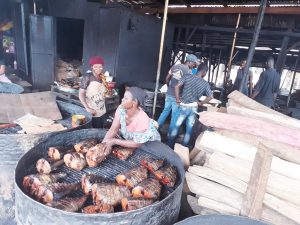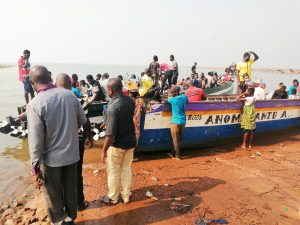Ghana’s efforts at providing social development, employment and decent work in its fisheries sector must focus on improving education, health and social protection in fishing communities
This article is by Benjamin Betey Campion (bbcampion.frnr@knust.edu.gh), Department of Fisheries and Watershed Management at the Kwame Nkrumah University of Science and Technology, Ghana and Zereth Blankson (zerethblankson19@gmail.com), Department of Fisheries and Watershed Management at the Kwame Nkrumah University of Science and Technology, Ghana
Ghana has about 550 km of coastline on the Atlantic Ocean, along the Gulf of Guinea. Within the coastal space, more than two million people are directly and indirectly engaged in fisheries. The country’s engagement with the sea results in about 300,000 tonnes of fish every year, apart from nearly 74,000 tonnes from its inland waters. These landings still meet less than half the national demand because almost all its citizens eat fish. According to the Food and Agriculture Organization of the United Nations (FAO), Ghanaians consume 25.3 kg of fish per person each year. Therefore, to meet the national demand, canned fish (mainly herrings and sardines) and frozen mackerels are imported.
Even as fishing continues to be a major contributor to livelihood and employment in many countries, the issues related to the working environment of fishworkers are paramount. Concerns for human rights in fisheries and the labour practices associated with producing seafood have increased recently, partly because of publicly-reported labour abuses and deplorable working conditions in the industry. As a response, numerous governments and civil society entities have intervened in several ways. The benefits of decent work include a fair wage, security at work and social protection for families, improved opportunities for personal growth and social integration, freedom for people to express their concerns, to organize and take part in decisions that affect their lives, and equality of opportunity and treatment for women and men.
Decent work, therefore, encompasses much more than what is provided; it may not be fully realized in many industries; the absence of serious abuses is unquestionably essential. The International Labour Organization (ILO) identifies four interrelated pillars of decent work: one, employment generation and enterprise development; two, standards and rights at work; three, social protection; and, four, governance and social dialogue among, say, employers, workers and governments.
In Ghana, work in fisheries and related activities is considered decent; fishers and fishmongers are proud of their work which carries no negative social attachment
Based on these, the Voluntary Guidelines for Securing Sustainable Small-Scale Fisheries in the Context of Food Security and Poverty Eradication (the SSF Guidelines) provided, to its member countries, some tenets for social development, employment and decent work in small-scale fisheries (SSF). In this article, we seek to assess Ghana’s efforts at providing social development, employment and decent work in its fisheries sector.
Decent work
In Ghana, work in fisheries and related activities is considered decent; fishers and fishmongers are proud of their work which carries no negative social attachment. Despite being a major source of employment, livelihood and way of life, Ghana’s fisheries industry is on the verge of collapse due to overfishing and over-capitalisation of the fishery. Illegal, unreported and unregulated (IUU) fishing is common. The largely artisanal industry competes for small pelagic stocks with industrial fishing boats. The political interests in both artisanal and industrial fishers make it difficult to find a way out. The artisanal fishers of Ghana, therefore, find themselves caught in a vicious cycle of IUU fishing practices as a coping strategy to declining catch.

The main artisanal fishing gear is the hand-crafted wood canoe, with or without an outboard motor. The promises of assistance to help them get fibreglass boats have not delivered. To exacerbate the situation, the average annual income per canoe has decreased by as much as 40 percent over the last 10 to 15 years. The fishery is overcapitalized and no fishing quotas or licence requirements for these artisanal fishers exist. The government has attempted to solve the free entry into the fishery through a canoe census and registration. These have largely not worked because of the lack of political will to enforce the laws. Fisheries management is top-down in Ghana: the government is expected to put in place measures to sustain the industry. Ghana has been flagged by the European Union (EU) for IUU, and it is hoped that this will be an opportunity to introduce appropriate mechanisms to stop the bad practices.
Knee-jerk promises
The SSF Guidelines urge governments to increase the proportion of total government spending on essential services like education, health and social protection in the sector. What exists are knee-jerk interventions and promises during the election season. Nothing is sustained afterwards. With climate change, the risks and frequency of disasters affecting fisheries are on the rise. Fishermen work throughout their lives and have neither retirement benefits nor social security. To improve the social protection of Ghanaian fisherfolk, the government initiated an insurance scheme. At its launch in 2016, more than one million fishers wer to benefit. The scheme was going to safeguard their canoes, outboard motors, fishing nets and other fishing inputs. Till date, though, there is not proof of the scheme’s implementation.
Fisheries management is top-down in Ghana: the government is expected to put in place measures to sustain the industry
Ghanaian fishing communities labour under some of the worst social services and infrastructure that can be found. News about access to education in some fishing communities of the Volta River is widely reported through the frequent incidents of students from distant communities drowning in their quest to reach schools. They travel long distances on the water to get to schools and are exposed to danger. Such difficulties mean children have to wait till a relatively late age to begin school. The dropout rate is high in such communities.
The health sector is in a poor state also. People have no option to travelling over long distances to seek basic healthcare. The National Health Insurance Scheme, implemented to reduce the burden of healthcare, is highly under-subscribed among the fishers. Several studies have shown that fishworkers are at high risk of acquiring lung diseases due to their long exposure to smoke. Not surprisingly, the health of fishmongers has attracted the attention of researchers and civil society organizations (CSOs).
One initiative to mitigate the problem of smoke is the newly invented ‘Ahoto’ oven, which has proven to be healthier and safer. The new oven consumes less fuel and has a fat collector that retains the fish oil, which can be used for other purposes. It also has a chimney that reduces the smoke or directs it away from the smoker. Unfortunately, the fishworkers have not adopted this new technology.
The SSF Guidelines seek to reduce child labour in the SSF. But child labour and trafficking has been widely reported in Ghana’s fishing communities. The distinction between child labour and children’s work is a very slight; many fishers neither agree with the categorization of their training nor deign to obtain assistance from their children under the guise of child labour. Some children have been rescued from hazardous fishing activities and are being given new opportunities. The incidence of poverty in Ghanaian communities drives parents to expose children to hazardous work. An increase in access to education will be a first step to reducing the incidence of child labour among fishing communities.
… the targeting and selection of beneficiaries for many of the government interventions are usually fraught with political interests
Poverty in fishing communities is deep-seated and efforts to reduce this must be as rigorous and as diametrical as possible through the building of capacity to change the lives of the people in these circumstances. Therefore, the SSF Guidelines recommend the setting up vocational training centres in SSF communities to build capacity and diversify into alternative livelihood sources. To this end, a school called the Anomabo Fisheries College is being set up to train the next generation of fishers about Ghanaian fisheries and aquaculture.

An alternative Livelihood and Revolving Fund has been set up to increase the profit of fisherfolk while strengthening the country’s capacity to sustainably manage the fisheries, reduce illegal fishing, enhance value addition, and develop aquaculture. Furthermore, ad hoc training in financial management, savings and investment is being provided by several government agencies and NGOs. However, the targeting and selection of beneficiaries for many of the government interventions are usually fraught with political interests. A lot of these promises or interventions are yet to become operational.
Good news
Despite these shortcomings, it is possible to conclude this assessment with some good news. The sector has made significant achievements in governance. There are traditional institutions of fisheries governance, such as the chief fishman and konkohemaa (chief fishmonger), which are highly respected and play significant roles. At the national level, SSF representatives and their organizations have the membership of the managing authority of Ghana’s fisheries, the Fisheries Commission. They are the National Fisheries Association (Fishing Vessel Owners), the National Fisheries Association (Artisanal Fishermen), and the Ghana Marine Fishing Officers’ Association. These associations are vibrant; their presence and interventions are well appreciated.
In accordance with the SSF Guidelines, policies and programmes related to fisheries in Ghana are being developed with the involvement of these organizations, along with other institutions. The successes in fisheries governance and representation must translate into reversing the situation of the fishery, which is on the verge of collapse, and help reduce IUU fishing. Programmes and initiatives of governments and CSOs with interest in fisheries should focus on improving education, health and social protection in fishing communities.
For more
No Child’s Play
https://icsf.net/wp-content/uploads/2021/06/4308_art_Sam77_e_art07.pdf
Social Development and Sustainable Fisheries: Ghana by Peter L.A.
The smoke lingers on
https://icsf.net/wp-content/uploads/2021/06/42_art07.pdf
The State of World Fisheries from a Fishworker Perspective: The Ghanaian Situation
https://icsf.net/resources/the-state-of-world-fisheries-from-a-fishworker-perspective-the-ghanaian-situation-2/